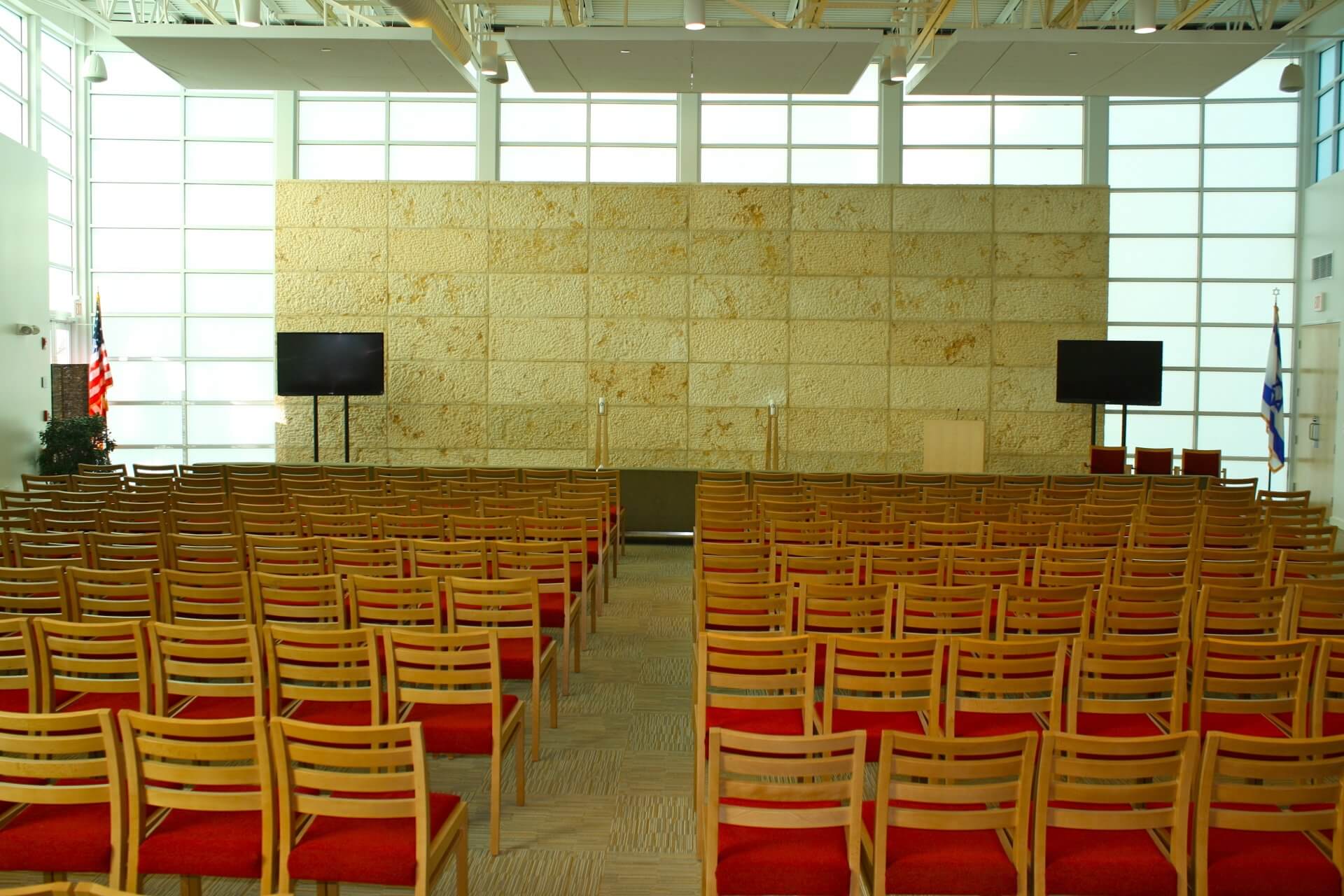Traditional Jewish Funeral
Traditional Jewish Funerals
All Jewish funerals regardless of which denomination are solemn and simple. There are no flowers displayed, music is not played, embalming is discouraged since there is no viewing, simple wood caskets are used, often the body is clothed in plain shroud instead of fancy clothes, and it is ideal that burial take place as soon as possible (Jewish Gilroes, 2018).
As guests enter and take their seats for the funeral ceremony, the immediate family stays in a private room. Once all guests are seated, the family then takes their seats at the front row. The funeral ceremony is fairly brief. The actual structure depends on the Rabbi or Officiant. It will usually consist of prayers, psalms, and inspirational readings. Before the funeral ceremony concludes, the eulogy, referred to as the hespeid for Jews, is given by a family member, a friend, or the Rabbi. The hespeid is not meant to give a full life story, but rather it should only highlight some of the great qualities of the deceased. The funeral ceremony closes with the congregation standing and singing the El Malei Rachamim prayer. The prayer expresses the hope that the deceased will be given eternal peace. El Malei Rachamim translates to mean “God full of compassion”. Below we provide the English, Hebrew, and transliteration versions for the El Malei Rachamim prayer (Shiva.com, 2018).
After the funeral ceremony has concluded the family and guests proceed to the gravesite. Click here
to get a break down of the Jewish burial traditions performed at the cemetery.
Where do we hold our Traditional Jewish Funerals?
We give you the option to hold the Jewish funeral at either a local temple/synagogue or at one of our chapels. If you are an existing member of a synagogue, we will work with the Rabbi and staff to organize the funeral arrangements. If you want to hold your funeral ceremony at a synagogue, but are not an official member of a synagogue we can contact one and make the arrangements. Below are a list of some local Chicago synagogues/temples:
2) Temple Chai
7) Skokie Valley Agudath Jacob
We have two chapels at both of our Buffalo Grove and Skokie locations. They are flexible in accommodating both small intimate gatherings and larger funeral services.
Kriah
Kriah translates to mean “tearing”. It is a Jewish funeral custom that occurs just before the funeral ceremony in a private room and involves only the immediate family. On the Orthodox or more traditional side of Judaism, family members will make a small tear of their garments. On the more modern or Reform side of Judaism, family members opt to wear a black ribbon. For those who lost a parent the tear or Kriah ribbon should be on the left side of the chest over the heart. For those mourning another family member or spouse other than a parent, the tear or Kiah ribbon should be on the right side of the chest. If you opt to tear your clothing, it should start at the neckline and go vertically down about 3 inches. The video below helps explain how to perform the tearing.
The Kriah symbolizes the personal pain and grief felt from the loss of a loved one. It is always done while standing because it shows strength during a time of grief. Before the tearing takes place, the family recites the following prayer:
Barukh atah Adonai Eloheinu melekh ha’olam dayan ha’emet.
This translates to :
Blessed are You, Adonai Our God, Ruler of the Universe, the True Judge.
The torn clothing or black ribbon is worn during the seven days of shiva (My Jewish Learning, 2018).
El Malei Rachamim - Version for Males
English
God, full of mercy, who dwells in the heights, provide a sure rest upon the Divine Presence's wings, within the range of the holy, pure and glorious, whose shining resemble the sky's, to the soul of (Hebrew name of deceased) son of (Hebrew name of his father) for a charity was given to the memory of his soul. Therefore, the Master of Mercy will protect him forever, from behind the hiding of his wings, and will tie his soul with the rope of life. The Everlasting is his heritage, and he shall rest peacefully upon his lying place, and let us say: Amen.
Hebrew
אֵל מָלֵא רַחֲמִים שׁוֹכֵן בַּמְּרוֹמִים, הַמְצֵא מְנוּחָה נְכוֹנָה עַל כַּנְפֵי הַשְּׁכִינָה בְּמַעֲלוֹת קְדוֹשִׁים וטְהוֹרִים כְּזוֹהַר הָרָקִיעַ מַזְהִירִים (נִשְׁמַת (פלוני בן פלוני ,שֶׁהָלַךְ לְעוֹלָמוֹ בַּעֲבוּר שֶׁנָדְבוּ צְדָקָה בְּעַד הַזְכָּרַת נִשְׁמָתוֹ .בְּגַן עֵדֶן תְּהֵא מְנוּחָתוֹ לָכֵן בַּעַל הָרַחֲמִים ,יַסְתִּירֵהוּ בְּסֵתֶר כְּנָפָיו לְעוֹלָמִים ,וְיִצְרֹר בִּצְרוֹר הַחַיִּים אֶת נִשְׁמָתוֹ ה' הוּא נַחֲלָתוֹ, וְיָנוּחַ ,בְּשָׁלוֹם עַל מִשְׁכָּבוֹ וְנֹאמַר אָמֵן
Transliteration
Al molay rachamim, shochayn bam’romim, ham-tzay m’nucha n’chona al kanfay Hash’china, b’ma-alot k’doshim ut-horim k’zo-har haraki-a mazhirim, et nishmat (Name of the Deceased) she-halach l-olama, ba-avur shenodvu tz’dakah b’ad hazkarat nishmata. B’Gan Ayden t’hay m’nuchata; la-chayn Ba-al Harachamim yas-tire-ha b’sayter k’nafav l’olamim, v’yitz-ror bitz-ror hacha-yim et nishmatah, Ado-nay Hu na-chalatah, v’tanu-ach b’shalom al mishkavah. V’nomar: Amayn.
El Malei Rachamim - Version for Females
English
God, full of mercy, Who dwells above, give rest on the wings of the Divine Presence , amongst the holy, pure and glorious who shine like the sky, to the soul of (Hebrew name of deceased) daughter of (Hebrew name of her father), for whom prayer was offered in the memory of her soul. Therefore, the Merciful One will protect her soul forever, and will merge her soul with eternal life. The Everlasting is her heritage, and she shall rest peacefully at her lying place, and let us say: Amen.
Hebrew
אֵל מָלֵא רַחֲמִים שׁוֹכֵן בַּמְּרוֹמִים, הַמְצֵא מְנוּחָה נְכוֹנָה עַל כַּנְפֵי הַשְּׁכִינָה בְּמַעֲלוֹת קְדוֹשִׁים וטְהוֹרִים כְּזוֹהַר הָרָקִיעַ מַזְהִירִים (אֶת נִשְׁמַת (פלוני בן פלוני ,שֶׁהָלַכָה לְעוֹלָמה בַּעֲבוּר שֶׁנָדְבוּ צְדָקָה בְּעַד הַזְכָּרַת נִשְׁמָתה .בְּגַן עֵדֶן תְּהֵא מְנוּחָתה לָכֵן בַּעַל הָרַחֲמִים ,יַסְתִּירֵהוּ בְּסֵתֶר כְּנָפָיו לְעוֹלָמִים ,וְיִצְרֹר בִּצְרוֹר הַחַיִּים אֶת נִשְׁמָתה ה' הוּא נַחֲלָתוֹ, וְיָנוּחַ ,בְּשָׁלוֹם עַל מִשְׁכָּבוֹ וְנֹאמַר אָמֵן
Transliteration
Al molay rachamim, shochayn bam’romim, ham-tzay m’nucha n’chona al kanfay Hash’china, b’ma-alot k’doshim ut-horim k’zo-har haraki-a mazhirim, et nishmat (Name of the Deceased) she-halcha l-olama, ba-avur shenodvu tz’dakah b’ad hazkarat nishmatah. B’Gan Ayden t’hay m’nuchatah; la-chayn Ba-al Harachamim yas-tire-ha b’sayter k’nafav l’olamim, v’yitz-ror bitz-ror hacha-yim et nishmatah, Ado-nay Hu na-chalatah, v’tanu-ach b’shalom al mishkavah. V’nomar: Amayn.
Sources:
Jewish Gilroes. (2018). Rituals and customs. Retrieved from: http://jewish-gilroes.org.uk/gilroes/rituals-and-customs/
My Jewish Learning. (2018). The basics of kriah, or tearing a piece of clothing. Retrieved from: https://www.myjewishlearning.com/article/the-basics-of-kriah-or-tearing-a-piece-of-clothing/
Shiva.com. (2018). Kel maleh rachamim (prayer of mercy). Retrieved from: https://www.shiva.com/learning-center/prayers/kel-maleh-rachamim/
Phone: 847-478-1600
Goldman Funeral Group
195 N. Buffalo Grove Road
Buffalo Grove
IL
60089
Fax: 847-478-1616
Phone: 847-478-1600
Skokie Chapel
8851 Skokie Boulevard
Skokie
IL
60077
Fax: 847-478-1616


